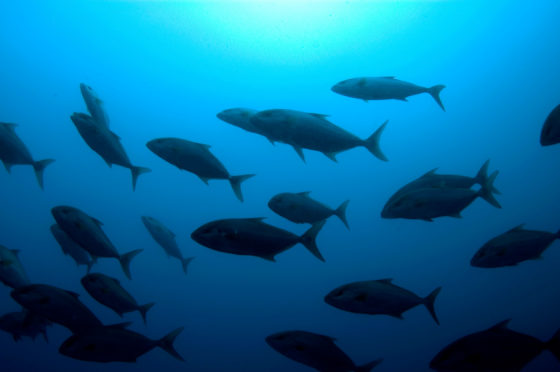A handful of mining corporations exert a heavy influence over the international negotiations determining the future of the seabed, lobbying governments to urgently finalise rules that would allow for full-scale mining of the deep ocean to begin, according to a new report from Greenpeace.
Scientists warn that deep seabed mining will cause biodiversity loss. Both by destroying seabed life where mining would take place, with little prospect of recovery, and by generating plumes, light, toxins and noise that could impact both benthic and mesopelagic marine life far beyond actual mining sites.
The past year has seen growing calls for a moratorium on deep-sea mining. Deep Sea Conservation Coalition and hundreds of NGOs, the European Parliament, the European fisheries industry and several renowned scientists recommend precautionary action to protect the deep sea from irreversible large-scale harm.
In a new report – Deep Trouble: the Murky World of the Deep Sea Mining – Greenpeace reveals the main industry players behind the controversial deep sea mining industry, showing who stands to benefit and who is left at risk if governments allow deep sea mining exploitation to begin. The analysis tracks the ownership and beneficiaries of private companies who are behind calls to open up the seabed to commercial mining.

An area roughly the size of France and Germany combined has already been opened up to exploration for deep sea mining. To date, 30 contracts to explore for deep sea mining viability, covering over a million square kilometres of the international seabed, have been given out by the United Nations International Seabed Authority (ISA). Nearly a third of these contracts involve private companies, largely headquartered in North America and Europe.
The 16 contracts to explore for minerals in the Pacific’s Clarion-Clipperton Zone are now dominated by four entities; Canadian-registered DeepGreen, Belgian corporate Dredging, Environmental and Marine Engineering NV (DEME) and US arms manufacturer Lockheed Martin, according to the report.
The deep sea is home to the greatest diversity of species and ecosystems on Earth. It provides critical environmental goods and services, including long-term carbon sequestration and is characterized by environmental conditions that make it highly vulnerable to human disturbance.
”Deep sea mining would be terrible news for the climate, disrupting crucial carbon sinks in the ocean; for people, jeopardising food security and livelihoods; and for wildlife, threatening ecosystems we barely understand”, said Louisa Casson, from Greenpeace Protect the Oceans campaign, and continued: “Some companies pushing this risky industry are literally speaking on behalf of countries at the UN. It’s staggering. The deep ocean, the world’s largest ecosystem, must remain off-limits to the mining industry”.
The European commission joined the call for a moratorium on deep sea mining when the new EU Biodiversity Strategy was published in May 2020. The strategy states:
‘In international negotiations, the EU should advocate that marine minerals in the international seabed area cannot be exploited before the effects of deep-sea mining on the marine environment, biodiversity and human activities have been sufficiently researched, the risks are understood and the technologies and operational practices are able to demonstrate no serious harm to the environment, in line with the precautionary principle and taking into account the call of the European Parliament. In parallel, the EU will continue to fund research on the impact of deep-sea mining activities and on environmentally friendly technologies. The EU should also advocate for more transparency in international bodies, such as the International Seabed Authority.’
“The International Seabed Authority is supposed to be protecting the oceans and it’s not doing its job”, Louisa Casson continues.
It remains to be seen if the EU strategy now will be translated into concrete action. This far the EU has been acting as a ‘silent’ member of the International Seabed Authority (ISA), refraining from taking an active role in the negotiations or from coordinating the positions of EU member states. Belgium, France, Germany, the United Kingdom, Bulgaria, Czechia, Poland and Slovakia are currently sponsoring deep sea exploration licences in the Atlantic Ocean, the Indian Ocean and Pacific Ocean.